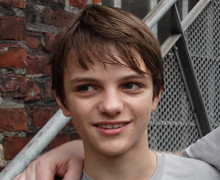Interview with Dominik George and Eike Jesinghaus
The Veripeditus AR Game Framework. Enabling everyone to freely create Augmented Reality Games


Dominik George and Eike Jesinghaus will give a talk about The Veripeditus AR Game Framework. Enabling everyone to freely create Augmented Reality Games at FOSDEM 2017.
Q: Could you two briefly introduce yourself?
-
Eike: I am Eike Jesinghaus, a 15-year-old from Germany who has been programming games for almost 5 years now. I attend a German Gymnasium (lycée). Since I was eleven years old, I engage in teaching game programming to children at Teckids e.V., which is part of why I am
working on Veripeditus.
-
Nik: I am a software developer and systems administrator from Bonn in Germany. Apart from that, I am head of Teckids e.V., the youth organisation centered around free software.
Q: What will your talk be about, exactly? Why this topic?
The talk will be about why Veripeditus was made, how it was made, and, most importantly, how people can use it for their projects. Veripeditus is quite a young project, having only published one beta release so far, but its features and principles provide so many use cases which we want to talk about and get the community started with Augmented Reality game programming.
Q: What do you hope to accomplish by giving this talk? What do you expect?
We want people to know about Veripeditus and we want to see the games and other ideas they come up with. While we also want to present what we did and what it can be used for, we really most of all intend to get a lot of feedback and give people something to play with and use in their free time, work, in education, you name it.
Q: What does the name Veripeditus mean and why did you choose this name?
The name derives from the Latin words veritas (truth) and pedis (feet). It describes what Veripeditus is all about: making games that require you to walk around in the real world. We really just chose a Latin name because we thought it was kind of cool and we both happen to be vexatious language nerds ;).
Q: What’s the history of the Veripeditus project? Why did you start it and how did it evolve? Has it become what you planned it to be?
We started working on Veripeditus pretty much at the same time when Pokémon Go was announced. We felt that it should be possible for everyone to freely create such games. At the moment, there only is a handful of games of that kind, none of which care about privacy, on a side note.
When we started, our intention was only to make it possible to create AR games, and we planned to do one or two of those ourselves. In that regard, the project did not evolve exactly like we planned it - as the project advanced, we found more and more possibilities, and got a ton of new ideas what the framework could be used for.
Today, one of the most interesting use cases is education, both through the creation of educational games in Veripeditus and the use of the framework in programming classes.
Q: What knowledge do I need to create an AR Game with Veripeditus? And how do I start?
Creating a game for Veripeditus is straightforward with minimal Python knowledge. Basically, knowing about variables and Python’s compound types is enough, as creating a simple game can be as easy as grouping a list of key/value pairs in some classes. We did, in fact, make t-shirts with a complete working game on it ;)!
But you are not limited to that. Veripeditus can be plugged into at any point to extend the game logic with standard Python methods, and with a game cartridge being a plain standard Python module, game creators are not limited in what code they write, what libraries they use, and so on.
Q: What does the project’s community look like? How can interested people help?
The community, at the moment, is small. That’s why we, as already told, want people to know about Veripeditus. Even programming beginners can make games in Veripeditus, so the community could reach out to beginners as well. While we certainly want developers to make Veripeditus itself even greater, we also want non-programmers to get started in creating games for whatever they can use the concept for.
Interested people can contribute to Veripeditus in a variety of ways. Ideas are very welcome, and we have a collection of very interesting feature requests. Apart from code contributions and bug reports, we think that one of the most important kinds of contributions is feedback on how the project is used by others. So if anyone uses Veripeditus in their computer science class, great, tell us! If the children there need a cool new feature, tell us! Did you find some other use case for AR gaming that we didn’t even think of? Tell us ☺.
Reports, feature requests and code contributions can be handed in at our GitHub project right now. We might be moving away from there in the future, because GitHub locks out a major, important part of the Veripeditus community in their Terms of Use.
Q: What do you mean, GitHub locks out part of your community?
GitHub explicitly ban contributors younger than 13 years from using their website. They do this because they believe that COPPA, the US Children Online Privacy Protection Act, requires them to do that.
While this wouls seem like a non-issue to most projects, it is an issue for us because we actually do have students between ten and 13 years who already have a list of features they would like to see in Veripeditus, and they have no way of contributing that and have their contributions credited to them, even if their parents agree and they get guidance. At Teckids e.V., we see contributions by children of that age on a regular basis.
As I already said, most projects will not see or understand this issue, but for us, it is a real life problem, and we believe that access to free software and contribution to it must not be limited for any sub-group of people by a third party, even less when it comes to educational software.
Q: Which new features can we expect this year in Veripeditus?
Veripeditus offers a lot of simplicity in AR game creation right now, and has basic features for game play. The next steps are making it more accessible and making the web app look cooler. Some of the ideas for that include:
- Implementing a better map, with game-defined map styles and rendering, options
- An interactive online game editor
- Allowing real WebGL 3D models
Q: Have you enjoyed previous FOSDEM editions?
-
Eike: No, this is my first attendance, but I am looking forward to it very much.
-
Nik: Sure. I have been a regular FOSDEM attendee and volunteer for the last six years already!
This text may also be used under CC-BY 4.0 Unported or later, at your option.

Creative Commons License
This interview is licensed under a Creative Commons Attribution 2.0 Belgium License.